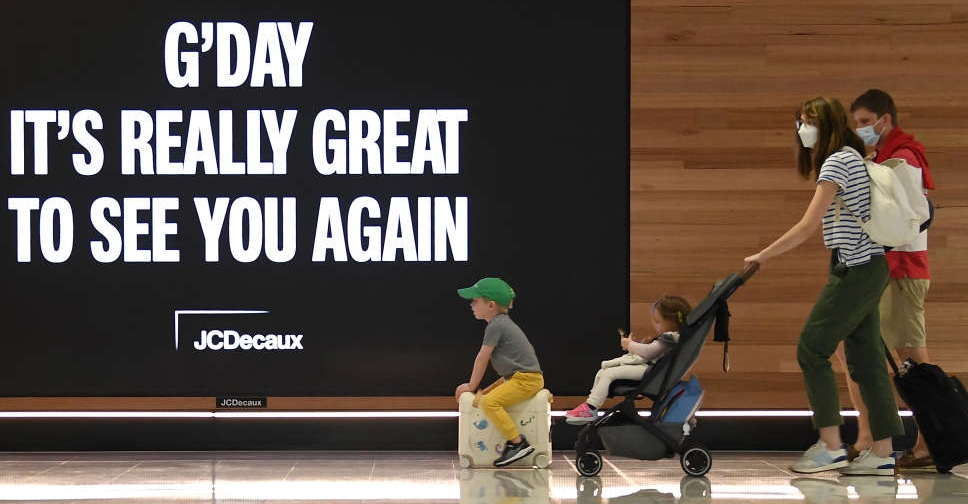
Australia eased its international border restrictions on Monday for the first time during the coronavirus pandemic, allowing some of its vaccinated public to travel freely and many families to reunite, sparking emotional embraces at airports.
After more than 18 months of some of the world's strictest coronavirus border policies, millions of Australians are now free to travel without a permit or the need to quarantine on arrival in the country.
While travel is initially limited to Australian citizens, permanent residents and their immediate families, it sets in motion a plan to reopen the country to international tourists and workers, both much needed to reinvigorate a fatigued nation.
Passengers on the first flights from Singapore and Los Angeles arrived in Sydney early in the morning, many greeted by tearful friends and relatives they had not seen for several months. Travellers were also welcomed by airline staff holding banners and were gifted Australian wildflowers and chocolate biscuits.
In Melbourne, a water cannon sprayed a Singapore Airlines plane in celebration as it taxied down the tarmac after landing.
In one of the world's toughest responses to the coronavirus pandemic, Australia slammed its international border shut 18 months ago, barring foreign tourists and banning citizens from either exiting or arriving unless granted an exemption.
The strict travel rules effectively prohibited many Australians from attending significant events, including weddings and funerals, as well as preventing people from seeing family and friends.
The relaxation of travel rules in Victoria and New South Wales states and the Australian Capital Territory comes as much of Australia switches from a COVID-zero pandemic management strategy towards living with the virus through extensive vaccinations.
While the Delta outbreak kept Sydney and Melbourne in lockdowns for months until recently, Australia's COVID-19 cases remain far lower than many comparable countries, with around 170,500 infections and 1,743 deaths, as of October 31.
Around 1,500 people were scheduled to fly into Sydney and Melbourne on Monday, according to airline industry group BARA.
NO TOURISTS YET
The change in travel rules, however, is not uniform across the country, with states and territories having differing vaccination rates and health policies.
Western Australia, which takes in one of the world's biggest iron ore precincts, remains largely cut off from the rest of the country - and the world - as the state tries to protect its virus-free status.
And while Thailand and Israel were due to welcome vaccinated tourists from Monday, foreign travellers were not yet welcome in Australia, with the exception of those from neighbouring New Zealand.
"We still have a long way to go in terms of the recovery of our sector, but allowing fully vaccinated Australians to travel without quarantine will provide the template for bringing back students, business travellers, and tourists from all over the world," Sydney Airport CEO Geoff Culbert said.
Citizens of Singapore are the next group to be allowed entry, from November 21.
Australian officials on Monday added India's Covaxin vaccine and China's BBIBP-CorV vaccine, made by Sinopharm, to a growing list of accepted vaccines, expanding the number of people who will be allowed to travel to Australia without quarantine.
Unvaccinated travellers will still face quarantine restrictions and all travellers need proof of a negative COVID-19 test prior to boarding.
Australia previously let only a limited number of citizens and permanent residents return from abroad, with a mandatory 14-day quarantine period in a hotel at their own expense. There were also some exemptions for foreign travellers on economic grounds, including, controversially, some Hollywood stars.

 UK inquiry finds 'chilling' cover-up of infected blood scandal
UK inquiry finds 'chilling' cover-up of infected blood scandal
 Iranian President Raisi killed in helicopter accident, state media says
Iranian President Raisi killed in helicopter accident, state media says
 ICC prosecutor seeks arrest warrants for Israeli, Hamas leaders
ICC prosecutor seeks arrest warrants for Israeli, Hamas leaders
 Assange given permission to appeal against US extradition
Assange given permission to appeal against US extradition
 Israel intends to broaden Rafah sweep, Defence Minister tells US
Israel intends to broaden Rafah sweep, Defence Minister tells US




